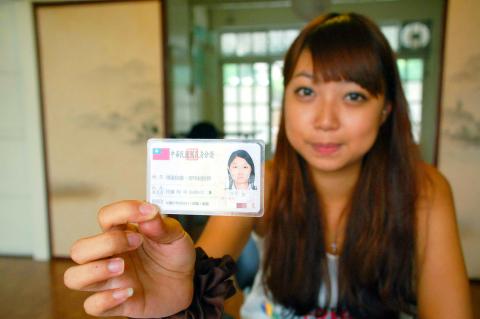Malai-yitzu Temalalate is a 20-year-old Paiwan woman. Her transliterated name in Chinese includes nine Chinese characters and a dot separating the two parts of her name. It had to be edited in a special way so that all the characters could fit in the space for names on the ID card. She said that because her name is so special, teachers often pay more attention to her during roll call. Many of her classmates want to get to know her because of her extremely long name, allowing her to make many new friends.
Temalalate studies at Tzu Chi College of Technology in Hualien. She is an only child, and both of her parents are also members of the Paiwan ethnolinguistic group. Her ancestors were chieftains, so she has always received a lot of attention since she was very little. Her father gave her the beautiful Paiwan name of Malai-yitzu, which refers to the beauty of a woman that even the blooming flowers and full moon cannot match. Temalalate identifies her as a member of a specific tribe.
She said she used to go by her Han Chinese name, Lee Nien-tzu, when she was a little girl, and that her elementary school classmates still call her by that name. She started using this significantly longer transliterated name when she started junior high school. At first she was not used to being called by the name at all, and it always takes a long time to write her entire name when she has to fill out forms or take exams. Since her classmates do not know what to call her, and in order to make things simpler when introducing herself, she tells them to call her Malai, which is a shorter version of her given name.

Photo: Lee Li-fa, Taipei Times
照片:自由時報記者李立法
Malai said there are about a dozen classmates in her school with an Aboriginal background, but she is the only one who uses an ancestral tribal name. She says that because of the name teachers always enjoy calling her name during roll call. Although she feels the name is an inconvenience when she gets a chop engraved or fills out applications, she is happy that companies tend to hire her because they think her name is very attractive.
(LIBERTY TIMES, TRANSLATED BY TAIJING WU)
「瑪萊依慈.得馬拉拉得」是位二十歲排灣族女性。音譯成中文的姓名包含間隔號總共十個字,身分證姓名欄得特別編排打印。她說,因為姓名特別,上課時常被老師點名,也因為名字很長,很多人都想認識她,讓她交到不少朋友。
就讀花蓮慈濟技術學院的瑪萊依慈.得馬拉拉得,是家中獨生女,父母親是排灣族原住民。來自頭目家族的她從小備受疼愛,父親幫她取了一個美麗的排灣族名字「瑪萊依慈」,意思是擁有閉月羞花之貌,「得馬拉拉得」則是氏族名。
她說,小時候有過「李念慈」的漢名,國小同學現在還叫她「念慈」,上了國中才使用這個較長的名字。剛開始很不習慣,每次填寫資料及考試時名字都要寫很久,同學們也不知道要怎麼稱呼她,為求方便好記,自我介紹時,她都請大家簡稱她為「瑪萊」。
瑪萊說,全班四十多人中具原住民血統的有十來個,只有她使用原族傳統名,老師點名最喜歡找她,雖然刻印章或申辦證件常感不便,但她在校外應徵打工時,卻有僱主認為她的名字具吸引力而錄取她。
(自由時報記者李立法)

A: Yet another shopping mall has just opened in Taipei. B: Do you mean the Mitsui Shopping Park LaLaport Nangang? A: Yeah, the shopping mall run by Japanese Mitsui & Co. opened last week. B: I hear the mall features about 300 stores, Vieshow Cinemas and Japanese Lopia supermarket. A: With the opening, a war is breaking out between Taipei’s department stores. A: 台北又有新的購物商場可逛啦。 B: 你是說Mitsui Shopping Park LaLaport 南港? A: 對啊這家日本三井集團旗下的商場上週開幕。 B: 聽說商場有威秀影城、樂比亞日系超市,還有多達300家專櫃。 A: 新商場一開幕,看來又要掀起一場百貨大戰啦! (By Eddy Chang, Taipei Times/台北時報張迪)

A: Hey, didn’t you go to the opening of the Mitsui Shopping Park LaLaport Nangang last week? B: Yeah, there are about 300 shops, including the first overseas branch of Japan’s Mahou Dokoro — a famous Harry Potter-themed store. A: Wow, I’ve always wanted to get a magic wand. B: There are also a bunch of great restaurants, such as Smart Fish hotpot restaurant. A: I wish I had Harry Potter’s “apparition” and “disapparition” magic, so I could teleport to the mall right now. A: 你上週不是有去LaLaport南港的盛大開幕嗎?有什麼特別的? B: 那裡有多達300家專櫃,包括魔法之地的海外首店——它可是日本知名的《哈利波特》專賣店。 A: 哇我一直想買根魔杖。 B: 另外還有各式各樣的美食,像是林聰明沙鍋魚頭。 A: 真希望我也有哈利波特的「現影術/消影術」魔法,能瞬間移動到商場去! (By Eddy Chang, Taipei Times/台北時報張迪)

When it comes to movies, some people delight in watching spine-chilling horror films. Surprisingly, apart from containing a few scares, horror movies may also offer an unexpected __1__. According to a study, watching 90 minutes of a scary movie can burn an average of 113 calories, which is roughly __2__ to taking a 30-minute walk. Researchers from the University of Westminster carried out an experiment in which they __3__ participants’ oxygen intake, carbon dioxide output, and heart rates while they were watching horror movies without any distractions. The results revealed that physiological responses to fear play a crucial role

Dos & Don’ts — 想想看,這句話英語該怎麼說? 1. 你覺得這部電影怎樣? ˇ What do you think of the movie? χ How do you like the movie? χ How do you think of the movie? 註︰What do you think of = What is your opinion of。 think 的受詞是 what,不能用 how。 2. 你認為哪一個歌星唱得最好? ˇ Which singer do you think is the best? χ Do you think which singer is the best? 註︰英語中 which singer 似乎是 do you think 的受詞,實則 do you think 是插入語,其他例子如下: 你以為他喜歡誰? Who do you think he likes? 你以為我住在哪裏? Where do you think I live? 你想我昨天在公園裏碰到了誰? Whom/Who do you think I met in the park yesterday? 3. 他不論到什麼地方,總是帶著一把雨傘。 ˇ No matter where he goes, he